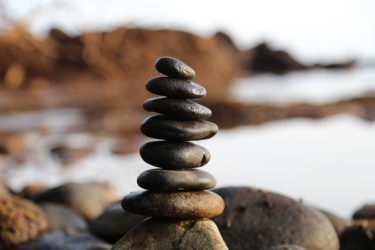It’s been a long day, but finally your tasks are done. The moon hangs high in the sky, the lights are turned down low, and your bed is begging you to take the load off and lie down. But as soon as your head hits the pillow, a nightmare of sorts begins. No matter how hard you try, you can’t get a good night’s sleep. Whether you’re struggling to quiet your mind and relax, or if you wake multiple times a night and can’t fall back asleep, or even if you sleep deeply every night but still wake tired, there is an answer for how to improve your sleep with Ayurveda.

In Ayurveda, sleep, like digestion, is one of the prime functions of a healthy life. Understanding your dosha and the general Ayurvedic principles surrounding sleep will help you create a unique bedtime routine to set you up for a soothing night of rest.
Common Sleep Problems for Each Dosha
As with so many things, Ayurveda recognizes that we all have individual needs and struggles when it comes to sleep. By understanding how each dosha is likely to struggle at nighttime, you’ll have a better grasp of what techniques and routines you should try.
Vata: When your mind is racing and you keep replaying the day’s events in your head, or thinking about your to-do list for tomorrow, Vata is likely to blame. This light, airy, restless dosha is great for inspiring movement and creativity — and can even encourage whimsical dreams when you’re able to sleep — but it also keeps us tossing and turning, often preventing rest and relaxation. Vata is known to be most active between 2 a.m. and 6 a.m., the time when most of us are trying to sleep. Additionally, Ayurveda assigns an overarching dosha to each phase of life, and those who are in the Vata stage of life, known as “life’s winter” (from the time of menopause to the end of life) may also experience lighter, more restless sleep at this stage.
To help address the sleep imbalances caused by Vata, grounding, warming activities are key. In particular, a soothing foot massage (preferably with essential oils or aromatherapy) will ground your nervous system, as feet are the part of the body most connected to the earth. With over 7,000 nerve endings, a foot massage can help your whole body relax.
Adding weight may also help to calm this dosha. Sleeping with a weighted blanket or a pillow placed over the legs can provide a sense of grounding and comfort to help stop your mind from racing.
If all else fails, a glass of warm milk with cinnamon or nutmeg, or a calming cup of chamomile tea can help put your mind at ease.
Pitta: Perhaps you have no trouble falling asleep. You may even sleep deeply. But if you find yourself waking multiple times a night, either with restless energy or hot flashes, and struggling to fall back asleep before the sun rises, you’re likely dealing with a Pitta imbalance. Pitta is a fiery, warm dosha. It gets us up and moving, helps to fuel our digestive fire, and gives us a passion and spark for life. However, Pitta is also most active between 10 p.m. and 2 a.m. — the period most of us are trying to relax and fall asleep. The period from puberty to menopause is considered “life’s summer” and is governed by Pitta, giving us a little extra boost when we might sacrifice sleep to attend to our careers, work, or other responsibilities. However, too much Pitta will make it hard to sleep through the night and wake feeling rested.
Like Vata, one of the top treatments for a Pitta-induced sleep struggle is a soothing foot massage. However, with Pitta you should aim to cool down, rather than warm up, your nervous system. Try running your feet under cold water, and use a cooling supplement like coconut oil on your skin to help your body relax.
You can also try a cooling breathing exercise, such as Sheetali Pranayama to help cool your constitution. Slowly inhale through your teeth, and feel the cold air on the roof of your mouth. Then, relax your jaw and exhale through the mouth. Repeat this five times.
Kapha: Unlike Vata and Pitta, if you have a Kapha dosha, you likely have no trouble falling asleep and staying asleep. In fact, your problem is likely that you sleep too long and too heavily, and you make still wake up feeling exhausted. Kapha is a wet, heavy dosha, which helps our bodies cling on to nourishment — which is why this dosha governs “life’s spring” from birth through puberty. Young children often sleep easily and heavily, thanks to the influence of Kapha that helps them grow. Because this dosha can inspire lethargy in excess, it’s important to try to wake up each day before the Kapha period, which is from 6 a.m. to 10 a.m.
Instead of focusing on how to slow down and relax, to balance a Kapha-based sleep disorder, you should make sure you get plenty of exercise during the day, particularly between 6 a.m. and 10 a.m. You should also be sure to follow a strict Kapha-balancing diet, and try to cut out excess caffeine and sugar to help the body return to its own natural balancing processes.
General Tips for Ayurvedic Sleep
Beyond honing in on each dosha, to improve your sleep with Ayurveda you should also follow some general guidelines.
- Eat an early dinner. Ideally your largest meal should be at midday, and you should finish dinner at least three hours before you plan to sleep.
- Reduce alcohol consumption. While alcoholic beverages can help you fall asleep initially, they can aggravate the liver and cause you to wake up in the middle of the night.
- End the day with a cup of warm milk or tea.
- Reduce the use of screens and electronics for two hours before bed. Instead, take a bath, read or journal to help you unwind.
- Develop a daily meditation, mindfulness or gratitude practice to help you clear your mind before bed.
- Go to sleep before 10 p.m.
Sweet Dreams
As you develop your own healthy sleep practice, remember that everyone’s journey is unique, and that your own individual sleep needs will change throughout your lifetime. However, achieving a good night’s rest is always worth the effort.
To help you get some shut-eye, you may consider adding YouVeda’s My Healthy Mood supplement to your daily routine. This doctor-formulated and recommended supplement is made with organic ashwagandha, saffron, bacopa, shilajeet and more to help you lower stress, support healthy adrenals and calm an overactive mind.


Shop this article: My Healthy Mood
Author: Alexandria Baker (YouVeda Wellness Contributor)




